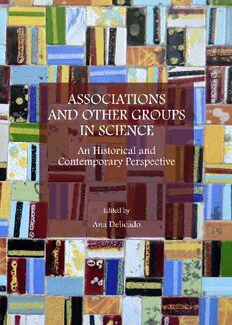
Associations and Other Groups in Science: An Historical and Contemporary Perspective PDF
Preview Associations and Other Groups in Science: An Historical and Contemporary Perspective
Associations and Other Groups in Science Associations and Other Groups in Science: An Historical and Contemporary Perspective Edited by Ana Delicado Associations and Other Groups in Science: An Historical and Contemporary Perspective, Edited by Ana Delicado This book first published 2013 Cambridge Scholars Publishing 12 Back Chapman Street, Newcastle upon Tyne, NE6 2XX, UK British Library Cataloguing in Publication Data A catalogue record for this book is available from the British Library Copyright © 2013 by Ana Delicado and contributors All rights for this book reserved. No part of this book may be reproduced, stored in a retrieval system, or transmitted, in any form or by any means, electronic, mechanical, photocopying, recording or otherwise, without the prior permission of the copyright owner. ISBN (10): 1-4438-5224-4, ISBN (13): 978-1-4438-5224-1 TABLE OF CONTENTS List of Tables ............................................................................................. vii Introduction ................................................................................................. 1 Ana Delicado Part I: The Role of Associations in the Development of Scientific Disciplines Chapter One ............................................................................................... 10 Of Objects, Networks, Politics and Poetics: The Royal Academy of Sciences of Lisbon in the Context of the Enlightenment Cristiana Bastos Chapter Two .............................................................................................. 30 The Association of Portuguese Archaeologists and the Establishment of Archaeology in Contemporary Portugal Ana Cristina Martins Chapter Three ............................................................................................ 45 Railways and the Portuguese Civil Engineers Association: Practice and Theory (1870-1899) Hugo Pereira Chapter Four .............................................................................................. 64 The Geographical Society of Lisbon and the New Challenges in the Science of the Nineteenth and Twentieth Centuries Rui Pinto Chapter Five ............................................................................................. 75 Scientific Societies during the Portuguese First Republic: An Historical Perspective on Cancer and Radioactivity Studies Ricardo Moreira vi Table of Contents Chapter Six ............................................................................................... 92 Modernizing Ambitions: Agronomists in Action between Dictatorship and Democracy (Portugal, 1957-1986) Dulce Freire Part II: Contributions of Scientific Associations to Profession and Society Chapter Seven ........................................................................................ 110 Scientific Associations: a Social Movement in Expansion but with Low Ambition? Raquel Rego Chapter Eight ......................................................................................... 126 Participation of Researchers in Professional Associations Luís Junqueira Chapter Nine ............................................................................................ 145 New (?) Actors in the Public Communication of Science: The Role of Scientific Associations Cristina Palma Conceição and Ana Delicado Chapter Ten ............................................................................................. 166 Caves with Life and Unexpected Remains: The Contribution of AESDA to Speleological Knowledge in Portugal Francisco Tátá Regala, Rui Luís, Rui Mergulho and Paulo Pacheco Chapter Eleven ........................................................................................ 179 Group of Studies in Human Evolution: Its Role in Society and in Science Sandra Assis and Vanessa Campanacho Chapter Twelve ....................................................................................... 189 Scientists, Environmentalists and the Nuclear Debate: Individual Activism and Collective Action Ana Delicado Contributors ............................................................................................. 209 Index ........................................................................................................ 213 LIST OF TABLES Table 7-1: Paid and voluntary workers in Portuguese scientific associationsin 2011 ........................................................................... 118 Table 7-2: Political influence of scientific associations by association type in 2011 ....................................................................................... 121 Table 8-1: Professional situation of members of the association ............. 133 Table 8-2: Age of members by association............................................. 134 Table 8-3: Area of residence of members by association ........................ 135 Table 8-4: Scientific area of last completed degree of members by association ..................................................................................... 135 Table 8-5: How members became aware of the association by scientific area ..................................................................................................... 138 Table 8-6: Motivations to join by association......................................... 140 Table 8-7: Participation in the association’s activities ............................ 141 Table 9-1: Scientific associations in Portugal by year of foundation ...... 150 Table 9-2: Proportion of “non-scientists” among the Portuguese scientific associations’ members ........................................................ 153 Table 9-3: Frequency of public communication of science activities, for young people and the general public, by type of association ....... 154 Table 9-4: Researchers’ motivations for belonging to a Portuguese Scientific Association, by type of association.................................... 156 Table 9-5: Collaboration with other institutions for the purpose of public communication of science, by type of scientific association ............. 156 INTRODUCTION ANA DELICADO Scientific societies or associations are quite an under-researched issue. Science studies have historically paid much more attention to non- formalised collectives in science: the “republic of science” of Polanyi (1962), the “scientific community” of Hagstrom (1965) and Merton (1973), the “invisible colleges” of Crane (1972), the “scientific field” of Bourdieu (1975), or the “transepistemic arenas” of Knorr-Cetina (1982). Theories of the Mode 2 production of knowledge (Gibbons et al. 1995; Nowotny, Scott and Gibbons 2001) postulate that in contemporary science there is a wider array of institutions taking part in the construction of scientific knowledge, but scientific associations are barely mentioned. Recent literature has devoted considerable attention to the “triple helix” formed by universities, government and industry (Leydesdorff and Etzkowitz 1996; Shinn 2002), but leaving out all other actors involved in science. Most of the existing literature on scientific associations focuses mainly on the historical dimension of scientific societies, such as their role in the birth of modern science (see Merton 1938 or Shapin 1996, for instance) or the genealogy of individual institutions, such as the Royal Society (Hunter 1989). Just a few noteworthy exceptions can be found: for instance, an in- depth case study of the Society of German Chemists authored by Rilling (1986), Schimank’s (1988) survey of German scientific associations, the studies on the development of international scientific associations by Shofer (1999, 2003). Some published research also deals with particular aspects of scientific associations’ activities, such as publishing (Levitan 1979), policy advice (Teich 2002), ethical regulation (Levine and Iutcovich 2003), award giving (Crosland and Galvez 1989), public understanding of science (Rogers 1981), or membership profiles (Mackie 2000). And yet, scientific societies in Europe seem to be gaining momentum both in individual countries (see, for instance, Guinovart 2009 on the Spanish Federation of Scientific Societies) and on a transnational level. This is apparent, for instance, in the Initiative for Science in Europe - ISE,
